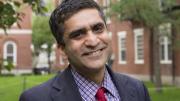Following nearly three months of deliberation and debate within the Harvard community, the heads of the University’s 12 undergraduate Houses will be renamed “Faculty Deans,” Faculty of Arts and Sciences dean Michael Smith announced in an e-mail Wednesday.
“[The House heads] found themselves unanimous in their belief that this was an opportune time for a title change,” Smith wrote, noting that they did not typically go by the title “master,” which many considered outdated and inconsistent with their roles in the twenty-first century. He responded to criticisms that the change reflected a misunderstanding of the etymology of “master,” which some students believe was linked incorrectly to America’s history of slavery:
Some have called it a “mistake” believing that we didn’t understand the root of the word ‘master,’ or that we lacked a proper appreciation for the history of the title at Harvard and the European institutions from which Harvard leaders took inspiration, or that we were acting too quickly and without thought to student demands. None of these could be farther from the truth. Titles can and should change when such a change serves our mission.
The new title “reflects our House leaders’ high standing in the joint academic and administrative hierarchy of the College,” Smith wrote.
“One has to realize that the meaning of words and symbols change over time,” said College dean Rakesh Khurana, the head of Cabot House, in an interview after the decision to change the title was announced. “Part of what is really important as an institution dedicated to higher learning is to engage critically and not just to take tradition and follow it blindly, but to be in conversation with it.” Other House heads have publicly echoed his view.
The Harvard Crimson’s editorial board, which opposed the decision to abandon the title when it was initially announced in December, immediately condemned the announcement. “[N]owhere whatsoever do we find any clearly stated rationale for the abolishment of a century-old tradition,” the board editorialized. “We opposed the change then, and we oppose it now.”
Read more coverage of the University’s wide-ranging debate on diversity and inclusion here.









